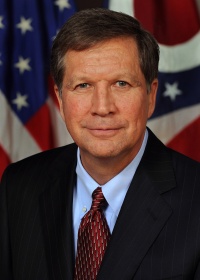Can Kasich win all 88 Ohio counties?

By Maggie Thurber | For Ohio Watchdog
CLEAN SWEEP? With everything seeming to go so well for Ohio Gov. John Kasich, will he be able to win all 88 counties?
Will John Kasich become only the third candidate in modern Ohio history to win all 88 counties?
Brad Hull thinks he might.
Hull, a Cleveland attorney, describes himself as a politically interested citizen, but not a political junkie.
In 2004, Hull was 23 and actively followed the national elections. He remembered George Voinovich did something pretty unique in his last run for U.S. Senate that year — He won in all 88 counties.
“I was curious to see if anyone else had ever done that and found John Glenn had done the same thing 30 years earlier,” Hull said.
Glenn defeated fellow Democrat Sen. Howard Metzenbaum in the 1974 primary after Metzenbaum accused the former astronaut and veteran of never having worked for a living. He went on to win that November and served as a U.S. senator until Jan. 3, 1999.
Hull said he saw a recent a Columbus Dispatch poll that showed Republican John Kasich ahead of his Democrat opponent, Ed FitzGerald, 60 percent to 40 percent.
“When Voinovich and Glenn won, they both got about 64 percent,” he said.
Emphasizing that’s he’s not an expert by any means, Hull said his anecdotal experience with voters in the Cleveland area makes him think another candidate can sweep the state this year.
“FitzGerald is a train wreck. His campaign is a train wreck. I haven’t seen a FitzGerald yard sign anywhere in Cuyahoga, one of the most liberal counties in the state,” he said.
FitzGerald’s campaign has been plagued by a series of missteps and negative revelations. His first running mate was discovered to owe more than $900,000 in back taxes. Then a police report surfaced showing FitzGerald was caught late at night in 2012 in a car with a woman who was not his wife. That led to revelations that he lacked a valid driver’s license for years, including when he was driving in vehicles paid for by taxpayers.
He also lags in fundraising.
“Combine that with the positive energy in Cuyahoga for the 2016 Republican Convention and it seems like the Republicans have a lot of positive energy — even in the traditionally Democratic Cuyahoga County,” Hull said.
The Democratic voters Hull knows respect Kasich and think he’s done a good job appealing to the center.
“But most also had no confidence, even if his campaign hadn’t failed so badly, that FitzGerald would turn out to be a strong candidate. They’ve never been optimistic about him mounting a strong challenge.”
Hull said it would be interesting if Kasich took all 88 counties. “I’m hoping he will because it will be historically unique.”
But is it likely?
David Stebenne, a professor of history at The Ohio State University who serves as the election historian at the Moritz College of Law, doesn’t think so.
“It’s really hard to do,” he said. “As popular as the governor is and as weak as his opponent is, I doubt he’ll carry all 88 (counties).”
Stebenne said Ohio has some unusual counties, which tend to be really Democratic or really Republican.
He said a good example was the election of 1956, when President Dwight Eisenhower carried 87 of 88 Ohio counties.
“He lost one of the Appalachian counties — a poor county where the residents tend to vote Democratic no matter what,” Stebenne said. “There was even some humorous discussion in the Oval Office about that one county.”
Stebenne thinks Kasich is weaker in those odd counties and in the major metropolitan areas, especially the ones that aren’t as prosperous. Because Ohio so closely mirrors the overall national electorate, it’s tough to sweep.
Glenn and Voinovich were “the two most popular candidates in modern history,” he added, “and they each only did it once. While Kasich is popular, he really doesn’t have the broad appeal that these two did.”
Stebenne said that both Voinovich and Kasich come from communities that tend to be more Democratic in voter registration, but that Kasich’s first race for governor was more divisive than the races for Voinovich.
“Voinovich had electoral success in Cleveland and as governor because he was able to persuade Democrats to vote Republican,” he said. “Glenn had national appeal across party lines.”
Kasich doesn’t really have either of those going for him, Stebenne said, but the 2014 election is similar to 1994, when Voinovich defeated Democratic State Sen. Robert Burch.
Voinovich won his re-election over Burch by winning over 70 percent of the vote.
“Burch was a weak candidate who said he never should have run,” Stebenne said. “I don’t think FitzGerald has said that — yet. Though he might still do so.”
Hull intends to vote Tuesday, but he thinks turnout across the state will be down.
“People just aren’t that excited,” he said.







